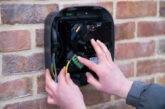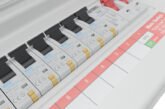
Andrew Pegrum, Deta’s Senior Technical Manager, offers some tips to help customers choose the right EV chargepoint for their requirements.
Finding the right EV chargepoint that suits the needs of your customers while being easy to install and maintain isn’t always a simple task. Despite there being a myriad of chargepoints now available on the market, they all operate slightly differently, which can make choosing the right product an overwhelming consideration.
By the end of 2024, we’ll see at least a 20% increase in electric vehicle sales (not accounting for plug-in hybrids), which is further indication of the growing number of chargepoints and installations required.
As such, let’s take a look at the top five pieces of information that installers should be aware of to assist customers in choosing a suitable chargepoint solution:
1. Electrical supply
Charging electric vehicles puts a large load on the supply for a prolonged period of time with no respite. For this reason, the size and maximum demand on this supply needs to be calculated in order to establish if there is spare capacity and whether some form of load management needs to be used.
Additionally, the Distribution Network Officer (DNO) must be notified before or after installation, depending on the type of installation and size of the supply.
Easy to achieve with the right equipment, load management requires the correct hardware and App. This can be carried out manually using CT clamps or the services of specialist companies (e.g. CPOs), who can manage this via the Cloud.
2. Installation
It goes without saying that chargepoints have to be located in parking areas for vehicles to connect to them, however there are still a number of things to consider, including wall or post mounting, ducting runs and the ability to easily alter cable for future upgrades.
As chargepoints are a smart connected product, consideration must be given to whether the data cable is routed to them directly as this can provide a more stable connection than using Wi-Fi. Also, where load management is used, a RS485 communications cable is often needed, such as in the case of connecting the energy meter with the chargepoint.
3. Usage
Electric chargepoints are smart connected devices as required by The Electric Vehicles (Smart Chargepoints) Regulations 2021, requiring an App to operate them. To provide an alternative to getting out your phone and using the App to start and stop charging, the Deta.e chargepoint has the option of using an RFID card.
Whether in a workplace or home setting, chargepoint owners can ask users to pay for electricity usage by setting up accounts through the user App. Chargepoints can either be tethered (supplied with a pre-fitted cable) or un-tethered (where a user has to supply their own cable).
The Deta.e charge point is supplied untethered but has the ability to lock the cable into it, effectively converting it to a tethered version if the user requires.
Should the cable become damaged, this has the advantage of allowing the user to easily replace it themselves without requiring a contactor. It should be noted, however, that in some UK locations tethered chargepoints are still not permitted.
4. Landlords
Where a user needs to pay for electricity used, such as a workplace setting, it is possible for the landlord or business to set up individual user accounts and manage this themselves. This effectively makes them a CPO (Charge Point Operator).
An alternative to this is to use the services of companies who not only manage the chargepoints by monitoring their usage, but also ensure they are maintained and operating effectively. These third-party companies will also manage the account and billing for users based on the energy they have used.
5. Grants
Building a network of smart home EV chargepoints is high on the agenda for the UK government. To support this growing industry, the Office of Zero Emission Vehicles (OZEV) offers grants to residential users, directly benefitting rented and rental properties.
Not only are tenants who are renting a flat able to apply for EV charging grants, so are landlords for flats and houses with off-street parking, making it an ideal time for landlords to invest in smart EV chargepoints like the Deta.e eDock or eVoom, and futureproof their investment properties.
Get more details about Deta’s range of chargepoints and solutions here
Read more industry feature articles here









